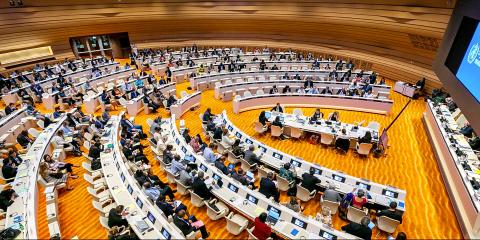The US House of Representatives on Tuesday unanimously passed a bill that would see Washington’s efforts to help Taipei regain observer status in the WHO included in an annual report by the US secretary of state.
Bill H.R. 353 was passed by a voice vote without objection, the Taipei Economic and Cultural Representative Office in Washington said.
The bill was introduced earlier this month by US Representative Ted Yoho, who serves as chairman of the Asia and Pacific Subcommittee under the House Committee on Foreign Affairs, and cosponsored by US representatives Eliot Engel, Michael McCaul, Steve Chabot and Brian Fitzpatrick.

Photo: WHO
A similar bill was last year passed by the US House of Representatives, but it did not make it onto the agenda of the US Senate before new legislators were sworn in on Jan. 3.
The version of the bill submitted by Yoho says that Taiwan did not receive an invitation to the World Health Assembly (WHA) in either 2017 or last year due to increased resistance from the People’s Republic of China, after having attended the annual assembly as an observer from 2009 to 2016.
“Taiwan remains a model contributor to world health, having provided financial and technical assistance to respond to numerous global health challenges,” the bill says.
Taiwan has since 1996 invested about US$6 billion in international medical and humanitarian aid efforts in more than 80 countries, it adds.
Although the US Congress has established a policy of support for Taiwan’s participation in international bodies that address shared transnational challenges, including the WHO, Interpol and the International Civil Aviation Organization, the bill says that “since 2016, Taiwan has not received an invitation to attend any of these events as an observer.”
The bill stipulates that an account of the changes and improvements made by the US in endorsing and attempting to obtain observer status for Taiwan at the WHA be included in an annual report by the US secretary of state, as is required by US Public Law 108-235, which was passed in 2004 to address Taiwan’s WHO participation.
In a news release yesterday, the Ministry of Foreign Affairs welcomed the bill’s passage and expressed its gratitude to the US House of Representatives for its support.
“Taiwan has made concrete contributions to combating epidemics and safeguarding global public health, and we are of indispensable significance,” the ministry said, pledging to do its utmost to secure an invitation to this year’s WHA, which is to be held from May 20 to May 28 in Geneva, Switzerland.
The Presidential Office also welcomed the move, thanking the US and other like-minded nations for their continuous support and assistance as Taiwan faces nonstop Chinese oppression.

US President Donald Trump yesterday announced sweeping "reciprocal tariffs" on US trading partners, including a 32 percent tax on goods from Taiwan that is set to take effect on Wednesday. At a Rose Garden event, Trump declared a 10 percent baseline tax on imports from all countries, with the White House saying it would take effect on Saturday. Countries with larger trade surpluses with the US would face higher duties beginning on Wednesday, including Taiwan (32 percent), China (34 percent), Japan (24 percent), South Korea (25 percent), Vietnam (46 percent) and Thailand (36 percent). Canada and Mexico, the two largest US trading

AIR SUPPORT: The Ministry of National Defense thanked the US for the delivery, adding that it was an indicator of the White House’s commitment to the Taiwan Relations Act Deputy Minister of National Defense Po Horng-huei (柏鴻輝) and Representative to the US Alexander Yui on Friday attended a delivery ceremony for the first of Taiwan’s long-awaited 66 F-16C/D Block 70 jets at a Lockheed Martin Corp factory in Greenville, South Carolina. “We are so proud to be the global home of the F-16 and to support Taiwan’s air defense capabilities,” US Representative William Timmons wrote on X, alongside a photograph of Taiwanese and US officials at the event. The F-16C/D Block 70 jets Taiwan ordered have the same capabilities as aircraft that had been upgraded to F-16Vs. The batch of Lockheed Martin

GRIDLOCK: The National Fire Agency’s Special Search and Rescue team is on standby to travel to the countries to help out with the rescue effort A powerful earthquake rocked Myanmar and neighboring Thailand yesterday, killing at least three people in Bangkok and burying dozens when a high-rise building under construction collapsed. Footage shared on social media from Myanmar’s second-largest city showed widespread destruction, raising fears that many were trapped under the rubble or killed. The magnitude 7.7 earthquake, with an epicenter near Mandalay in Myanmar, struck at midday and was followed by a strong magnitude 6.4 aftershock. The extent of death, injury and destruction — especially in Myanmar, which is embroiled in a civil war and where information is tightly controlled at the best of times —

China's military today said it began joint army, navy and rocket force exercises around Taiwan to "serve as a stern warning and powerful deterrent against Taiwanese independence," calling President William Lai (賴清德) a "parasite." The exercises come after Lai called Beijing a "foreign hostile force" last month. More than 10 Chinese military ships approached close to Taiwan's 24 nautical mile (44.4km) contiguous zone this morning and Taiwan sent its own warships to respond, two senior Taiwanese officials said. Taiwan has not yet detected any live fire by the Chinese military so far, one of the officials said. The drills took place after US Secretary